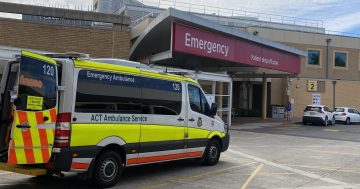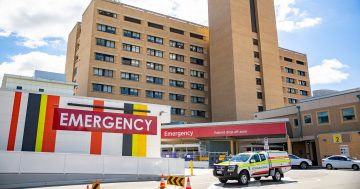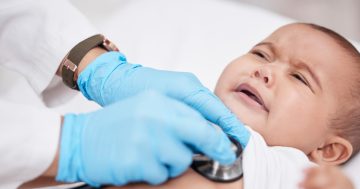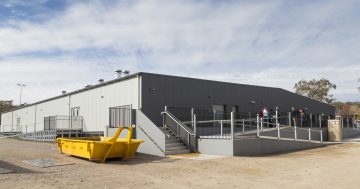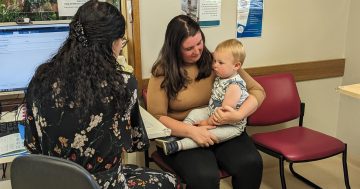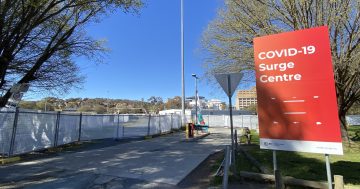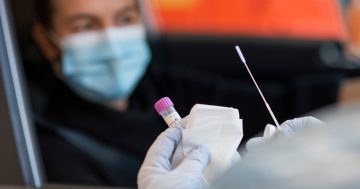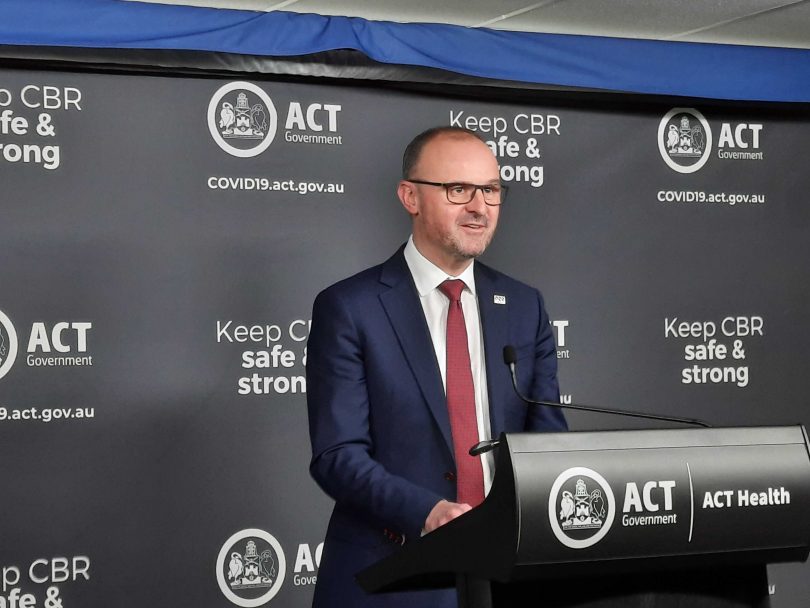
Chief Minister Andrew Barr said the long list of supermarkets as exposure sites reflected people’s need to eat and buy supplies. Photo: Ian Bushnell.
UPDATED 2:30 pm: Deputy Chief Health Officer Vanessa Johnston says Canberra’s case numbers may have plateaued, but she would like to see another couple of days under 20 before saying that the ACT was heading in the right direction.
She said the numbers were still bobbing around and 32 cases on Saturday “put out our rolling mean a bit”, and the proportion of unlinked cases was still too high.
But while the ACT might be able to get its outbreak under control, the threat from NSW, where regional towns such as Goulburn, Cooma and Batemans Bay reported positive cases today, is likely to be there for months.
Chief Minister Andrew Barr said the risk from NSW would only ease after cases and hospitalisations start to come down, but that was still months away.
“That’s the awful reality,” he said.
The risk was not just from NSW people coming into the ACT but also from returning Canberrans, Mr Barr said.
He said the risk would not go away until the ACT’s vaccination rate got to the highest possible level.
Helping to accelerate this would be the decision to reduce the gap between the first and second AstraZeneca doses, Mr Barr said.
He said this ought to mean that over 70s would get to 95 per cent fully vaccinated a few weeks earlier.
“With the combination of three vaccines – AstraZeneca now, Pfizer if you’ve got an appointment and then the Moderna coming online – I think this means the total vaccination program will be able to be completed more quickly,” Mr Barr said.
Dr Johnston said that while trials had shown that a three-month gap between AstraZeneca shots was optimal, in the current outbreak situation, it was more important to give people protection.
“What we are saying is, ‘get that protection early and do it now because you don’t know when you will be in contact with COVID-19’,” she said.
Dr Johnston said no matter what vaccine people received and what dosing schedule they were on, booster shots would still be required for everyone.
Mr Barr said the long list of exposure sites of mainly supermarkets reflected people’s need to eat and buy supplies, but he urged them to be quick and selective about when they did go out.
“I would minimise my time in supermarkets. I certainly would not be going every day, and I’d do my best to get what I needed and get out,” he said.
Mr Barr said this showed why any general reopening would have to be done in gentle steps.
“This serves as an important cautionary tale about the gentle steps that will be needed to reopen economic activity – not all at once, it needs to be measured and as low-risk as possible,” he said.
12:30 pm: There are 11 new cases of COVID-19 overnight, only three of whom were in quarantine throughout their infectious period.
And amid reports that some people on their way to a COVID-19 test have been stopping at supermarkets, pharmacies and fast food outlets, there’s been another plea to protect the community if you are potentially infectious.
“Don’t stop at the shops or anywhere else on the way to get tested or on your way home from getting tested … go directly home,” Deputy Chief Health Officer Dr Vanessa Johnston said at today’s press briefing.
“You may think a quick trip through a drive-through or with a mask is OK, but that’s not the case.”
There is ongoing concern about possible chains of transmission that are being missed because people are not coming forward promptly for testing, and some infections are being traced to people who made quick stops at shops while possibly infectious.
There are also reports of people attending medical appointments without disclosing that they are waiting for COVID test results, some of which were positive.
Health Minister Rachel Stephen-Smith said nobody would be denied urgent medical care and protective measures could be put in place, but not disclosing a COVID-19 testing status was completely unacceptable.
“This is not OK. This puts our staff and other patients at risk. We have a screening tool to determine whether it is safe to come in. Please complete this honestly,” she said.
Nine of the current cases are linked to exposure sites or identified close contacts and two are under early investigation. Eleven people are hospitalised and one is being ventilated in intensive care.
A total of 2488 tests were carried out yesterday, but health authorities say at least 3000 tests per day are needed for effective monitoring.
“As we’ve been seeing day on day, there’s a proportion of the community delaying getting tested when they’re developing symptoms. This is one of the major reasons why there are still cases infectious in the community,” Chief Minister Andrew Barr said.
“If you have symptoms, come forward. If you’ve been at one of the exposure sites at the times listed, please come forward for testing as soon as possible.”
Compliance has been generally strong across the Territory and Mr Barr said ACT Policing had carried out 426 traffic stops, issuing only three directions to leave the ACT. There is an improvement in mask-wearing, a focus for concern for several days.
“Thank you to Canberrans, to businesses who are doing the right thing. This is how we can operate business and have some economic activity – if people do the right thing. The wearing of masks is really important”, Mr Barr said.
The ACT Government’s priorities for the next week is on the plan to to reach a 75 per cent first dose vaccination rate for the 16-plus population and a 50 per cent fully vaccinated rate for people 16-plus.
Due to the outbreak, the period between AstraZeneca doses has been revised and a second dose can now be given four to eight weeks after the first dose, conferring full vaccine protection earlier. AstraZeneca is available through local GPs, pharmacies and the ACT Government clinic at Calvary Public.
Over the next seven days, the ACT will deliver 24,000 Pfizer bookings between the AIS hub and the Brindabella Centre, the single largest week of Pfizer distribution and delivery for the Territory.
The first Moderna vaccine shipments will arrive in the ACT later this month and the two-week program to vaccinate ACT students who are sitting their AST assessment in person begins today.
Minister Stephen-Smith said that the number of NDIS workers with a first vaccination dose has increased to almost 69 per cent while 46 per cent are fully vaccinated and 61 per cent of NDIS participants have also been vaccinated. There is a dedicated telephone line for front-line workers to book vaccination appointments.
The Access and Sensory Clinic is available for people with a disability and their support workers and carers. The quiet space has accessible entry, longer appointment times and support workers and carers can be vaccinated at the same time.
Next Monday (13 September) the clinic, which has been located at Garran, will move to a dedicated space at the Weston Creek Walk-In Centre where it will be open five days per week. Accessible testing for the disability community will take place at the Garran surge centre from Wednesday (8 September).
11:55 am: The ACT has recorded 11 new cases of COVID-19.
Fifteen cases were identified yesterday.
Of the 11 new cases, nine are linked to current or close contacts, and two are under early investigation.
Only three were in quarantine during their entire infectious period; seven were in the community for part of their infectious period, and one is under investigation.
Eleven people are hospitalised with COVID-19 and one is in intensive care on ventilation.
Almost 2500 tests were conducted yesterday, but Chief Minister Andrew Barr has reminded Canberrans to get tested at the first sign of COVID symptoms or if you have visited an exposure site.
Earlier today, Premier Gladys Berejiklian reported 1281 new cases in NSW and five deaths.
NSW Chief Health Officer Dr Kerry Chant said it was not just the elderly on ventilators.
“Sixty-seven people require ventilation; they span all age groups. It is critical that we understand that COVID presents risk across all age groups, so please get vaccinated,” Dr Chant said.
In Victoria, Premier Dan Andrews announced 246 local cases.

Woolworths at Dickson continues to be listed as an exposure site. Photo: Thomas Lucraft.
9:25 am: More than 60 new exposure sites are listed on the ACT COVID-19 website this morning, casting doubt on whether Canberrans are sticking to the lockdown rules.
With 237 active cases and the number of daily new cases remaining stubbornly high, the number of exposure sites suggests that too many Canberrans are moving around the city.
The exposure sites in both the north and south of the ACT include mostly supermarkets and petrol stations, but also a cafe, restaurant, child care centre, chemists, baby goods store, workwear store, the Australian War Memorial construction site, and a number of public transport routes.
Major shopping centres such as Westfield Woden and Belconnen, and Cooleman Court in Weston are listed as general exposure sites, as are ALDI and Woolworths at Gungahlin, and Woolworths Metro Franklin.
For the full list of close and casual contact exposure sites and times, check the COVID-19 website.
The ACT Government has also announced that Canberrans can now get their second dose of AstraZeneca between four and eight weeks after their first dose in a bid to increase vaccination rates.
Chief Minister Andrew Barr said the change was based on advice from the ACT’s Chief Health Officer in line with guidance from the Australian Technical Advisory Group on Immunisation.
“The best vaccine is the one that you can get today. We want to see more Canberrans fully vaccinated faster to give them protection during this outbreak,” he said
Minister for Health Rachel Stephen-Smith encouraged anyone with an existing AstraZeneca booking at the ACT Government’s Calvary Mass Vaccination Clinic to bring their second dose forward.
Anyone with a second-dose appointment already booked in will receive a message letting them know they are able to have their second dose sooner.
“You can reschedule your appointment online using the MyDHR portal, or by phoning the COVID-19 vaccination booking line on 5124 7700 between 7:00 am and 7:00 pm,” Ms Stephen-Smith said.
“AstraZeneca appointments are widely available for people aged 18 and over from GPs and pharmacies across the ACT. If you can’t get a Pfizer appointment soon and you want to get vaccinated faster, you can speak to your trusted health professional about AstraZeneca.
“People who have a second-dose AstraZeneca booking with their GP or pharmacist should contact them about bringing their appointment forward.”
ACT Chief Health Officer Dr Kerryn Coleman said the recommended interval between AstraZeneca doses had been changed due to the presence of the more transmissible Delta strain of COVID-19 in the community.
“Given the increased transmissibility of the Delta variant, it is now recommended that people have their second dose within the four to eight-week range,” Dr Coleman said.
“Bringing forward your second dose may have a small effect on the long-term protection of AstraZeneca vaccine but will make sure you are protected earlier.
“We know the vaccines are very effective at preventing illness and death. The Delta variant is easier to catch and, most importantly, is right here in our community.
“While the lockdown is helping to keep the number of cases under control, the best thing we can all do to protect ourselves, our loved ones and our community is to get vaccinated as soon as we can.”
ACT year 12 students and staff required to assist with the ACT Scaling Test, and HSC and IB if occurring at an ACT school can now book one of 5,500 priority Pfizer vaccination appointments reserved at the AIS during the fortnight from today (6 September).
For more information on who is eligible for a COVID-19 vaccine and how to book an appointment covid19.act.gov.au/vaccine.












